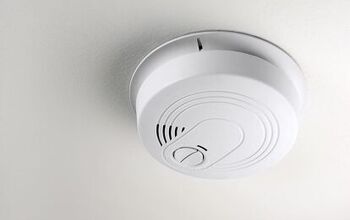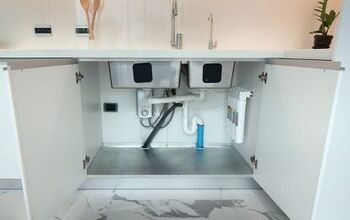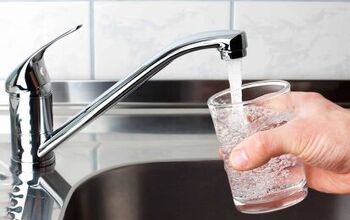Can Mice Climb Up Drain Pipes? (Find Out Now!)

There are few sights more unnerving to a homeowner than a mouse in the house. They are unsanitary, unwanted, and quite frankly frightening. So, can mice climb up drainpipes?
Mice can enter your home through weak points in the siding and climb up drainpipes. They can also access drainpipes from the sewer and chew through wood or PVC to enter the pipes. Place traps beneath your sink, seal drains with grated covers, and install a non-return valve to keep mice out of your drainpipes.
You can remove dead mice from your pipes with plumbing tools such as an auger and drain snake. Call a professional plumber or pest control service if you can’t keep mice out of your pipes. Follow along as we explore how mice can climb up drainpipes.
Do You Need Pest Control Services?
Get free, zero-commitment quotes from pro contractors near you.

How Do Mice Get in Under the Sink?
Rodents can get into places that humans cannot. So, you usually find them around dark, tight spots where there’s moisture or food. And if you don’t keep food stores in sealed containers, mice can smell it from long distances away. Then, they begin looking for ways inside your house.
One of their favorite ways is through drain pipes that access the space beneath your sink. Mice don’t always climb inside the lines, though. Usually, they get in by walking along the outside of your piping to reach access holes in your kitchen. From there, they freely sniff and nibble what they can find.
Can Mice Climb Up Drain Pipes?
Mice can climb up drainpipes and they frequently do to find food. They will do anything they can to get to food when they smell it, and many mice climb up through your pipes. The pipes beneath your sink are a common way that mice try to enter your home.
Food scraps beneath your sink attract mice and they can even detect it from outside. Mice sneak through small cracks and holes outside of your house to access the kitchen. Once inside, mice can easily get inside of your drainpipe and either climb all the way through or become stuck.
Can Mice Climb Up PVC Pipe?
It is easy for mice to climb up PVC pipes because it gives them a good surface to grip. Much like concrete or brick, PVC is rugged enough of a surface that mice won’t struggle to climb it. Materials such as glass are nearly impossible for mice to climb because the surface is too smooth.
Unfortunately, basic building materials such as vinyl, wood, and rubber cannot stop a mouse from entering your home. Mice have sharp teeth and they can easily chew through obstacles to access your pipes. Sure, PVC pipes are slippery on the inside, but mice can use their nails to dig in and work their way up.
How to Get Rid of Mice in Pipes
It is difficult to get rid of mice already in your pipes, but you can take precautions. Set up mouse traps beneath your kitchen sink or near whatever fixture the mice frequently enter. Use bait or purchase a trap that already has bait ensnare and eliminate the mice.
Hire a plumber to install a non-return valve so that mice won’t be able to make it far within your pipes. Non-return valves are stainless steel flaps that block rodents from getting into your pipes. Inspect your pipes and patch them with steel wool so that mice don’t have an easy form of entry.
Install grates over drains to limit mice access to your drainpipes. You may need to remove dead mice from your pipes before you can mouse-proof them. It isn’t a fun process, but you can fish out dead mice with an auger or drain snake. Thoroughly clean the drain and pipe with an enzyme cleaner after you remove a dead mouse.
How to Find Where Mice Get In
You may not have to spend money on a plumbing inspection because of a rodent infestation. If you can locate all of the entry points and check for holes, you should be fine. Meanwhile, try to look for cracks in your foundation or gaps where rodents can enter your home.
While you’re there, don’t forget to look underneath your porches. And try to check behind stairs as well. Mice like to hide where people can’t see them, which means you’ll have to look closely for the signs.
TIP: Watch for mouse droppings and materials that look chewed on or scratched.
Can Mice Get in Through Gutters?
Mice are clever, so it’s not hard for them to find new ways to get inside your home. Some of them even use your gutters to reach open access points on the roof. For homeowners, that means checking the house for small holes from top to bottom.
If you find holes on or around the roof, try to block them as soon as possible. Use chicken wire or hardware cloth for best results. And always secure the material with gutter screws to keep them from getting damaged or removed by rats.
TIP: Your gutters stay open year-round, so flush gutters as often as you can to remove rodent infestations and debris.
Do You Need Pest Control Services?
Get free, zero-commitment quotes from pro contractors near you.

Who is Responsible For Rats in Drains?
The homeowner is responsible for rats or mice in drains. This is true even if the rats or mice enter your drain through the sewer, unfortunately. You will need to contact a plumber or fix the problem on your own because your local sewer service won’t help you.
Related Questions
Why Do I Suddenly Have Mice in My House?
There are many reasons why you suddenly have mice in your home. For one, you could have several unknown access points that allow rodents inside. Bird feeders and pet food might also attract them to your property. Plus, poor sanitation and hygiene can lead to an infestation as well.
Are Mice Worse in the Summer or Winter?
Contrary to popular belief, mice don’t just infest houses in the winter when it’s cold outside. They also love coming inside in the summer heat. That’s because you keep your home temperature controlled. So, rodents sneak inside to cool themselves down and find small pools of water to drink. In the winter, they typically burrow and nest.
What Will Keep Mice Away?
Rodents have a strong sense of smell, and you can use that against them. Use natural mice repellents like ammonia, black pepper, and cloves. Or try peppermint essential oil if you prefer more pleasant odors. And if all else fails, hire an exterminator.
Say Goodbye to Mice Under the Sink
Don’t get comfortable with the mouse in your house because it’s not likely to stay. Once you close holes and gaps, mice will have no other choice than to leave. And if you double down with an effective repellent, they’ll stay gone forever.
Related Guides

Tiffany Nichols specializes in aesthetics, design, marketing, and manufacturing. She's a copywriter and editor for several home renovation companies in the U.S. and works alongside some of the biggest names in the industry. Her hobbies include architecture, art, mental health, and fashion.
More by Tiffany Nichols



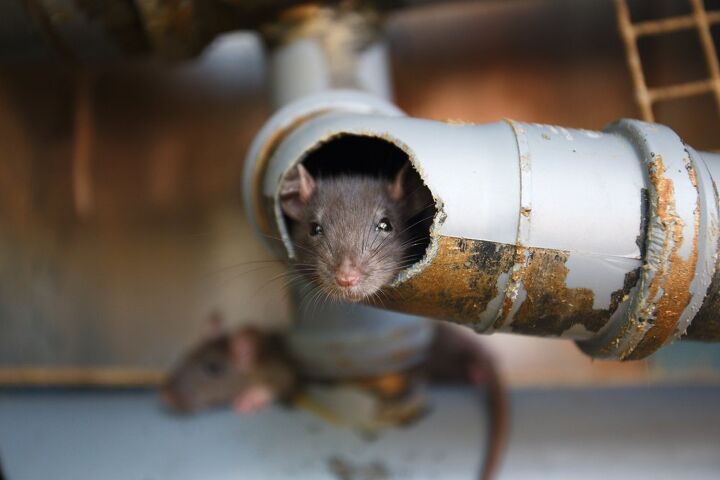







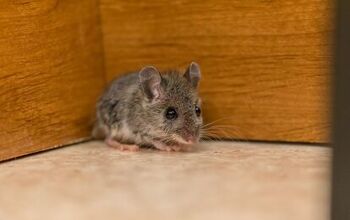



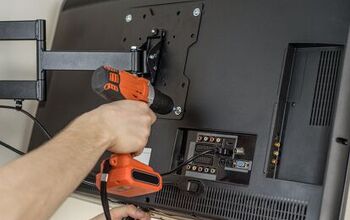
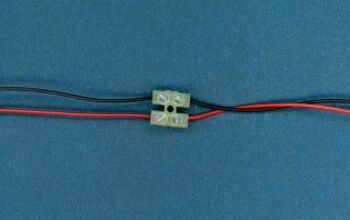
![Standard Dining Room Table Dimensions [for 4, 6, 8, 10 and 12 People]](https://cdn-fastly.upgradedhome.com/media/2023/07/31/9074335/standard-dining-room-table-dimensions-for-4-6-8-10-and-12-people.jpg?size=350x220)
